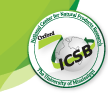Document Type
Oral Presentation
Location
Oxford Conference Center - Magnolia Room
Start Date
8-4-2019 1:30 PM
End Date
8-4-2019 2:00 PM
Description
In complementary medicine, extracts from different plants have been used in the treatment of several diseases, such as cancer, AIDS, tuberculosis, anxiety, among others. Nowadays, the market of herbal medicines moves a large part of the financial and economic resources in the world. In this context, it is very important to elucidate the phytochemical profile of the plants’ extracts in order to increase the pharmacologic uses of these promising natural substances. Our work will discuss and explore the confluence of current research topics related to natural products, with focus in the chronic diseases, specially cancer because it isstill a challenge for medicine.
Plants’ extracts exert effects through multiple keylock models and the production of secondary metabolites (diterpenes, triterpenes, steroids, flavonoids, ellagitannins) is directly related to the therapeutic potential of these natural products. To evaluate extract composition, phytochemical analyses can be performed, based on HPLC analysis, for example. Currently, the ultra-high resolution and accuracy of mass spectrometry, allow the identification of complex plant mixtures without prior extraction or separation steps. Besides, the use of multivariate statistical analysis using Partial Least Square Discriminant Analysis (PLSDA), applied in metabolomics studies, enables analyses of complex mixtures at the molecular level. An in-depth characterization of the compounds responsible for this chemical discrimination is currently performed to better understand their importance for the bioactivity of vegetal extracts. All of these aspects will be discussed in order to highlight the promising therapeutic potential of natural substances.
Prof. Carla Holandino Quaresma, PhD, Full Professor at Pharmacy College, Federal University of Rio de Janeiro
Correspondence address: Federal University of Rio de Janeiro, Health Sciences Center, Pharmacy College, Underground B, Rooms11, 34, Zip code: 21941-902. Rio de Janeiro, Brazil. Mobile phone: +55 21 99725-7775; Email address: cholandino@gmail.comorcholandino@pharma.ufrj.br
Recommended Citation
Holandino, Carla, "Session 3: "Therapeutic Potential Of Natural Products: Research And Development"" (2019). Oxford ICSB. 5.
https://egrove.olemiss.edu/icsb/2019_ICSB/day1/5
Publication Date
April 2019
Session 3: "Therapeutic Potential Of Natural Products: Research And Development"
Oxford Conference Center - Magnolia Room
In complementary medicine, extracts from different plants have been used in the treatment of several diseases, such as cancer, AIDS, tuberculosis, anxiety, among others. Nowadays, the market of herbal medicines moves a large part of the financial and economic resources in the world. In this context, it is very important to elucidate the phytochemical profile of the plants’ extracts in order to increase the pharmacologic uses of these promising natural substances. Our work will discuss and explore the confluence of current research topics related to natural products, with focus in the chronic diseases, specially cancer because it isstill a challenge for medicine.
Plants’ extracts exert effects through multiple keylock models and the production of secondary metabolites (diterpenes, triterpenes, steroids, flavonoids, ellagitannins) is directly related to the therapeutic potential of these natural products. To evaluate extract composition, phytochemical analyses can be performed, based on HPLC analysis, for example. Currently, the ultra-high resolution and accuracy of mass spectrometry, allow the identification of complex plant mixtures without prior extraction or separation steps. Besides, the use of multivariate statistical analysis using Partial Least Square Discriminant Analysis (PLSDA), applied in metabolomics studies, enables analyses of complex mixtures at the molecular level. An in-depth characterization of the compounds responsible for this chemical discrimination is currently performed to better understand their importance for the bioactivity of vegetal extracts. All of these aspects will be discussed in order to highlight the promising therapeutic potential of natural substances.
Prof. Carla Holandino Quaresma, PhD, Full Professor at Pharmacy College, Federal University of Rio de Janeiro
Correspondence address: Federal University of Rio de Janeiro, Health Sciences Center, Pharmacy College, Underground B, Rooms11, 34, Zip code: 21941-902. Rio de Janeiro, Brazil. Mobile phone: +55 21 99725-7775; Email address: cholandino@gmail.comorcholandino@pharma.ufrj.br

